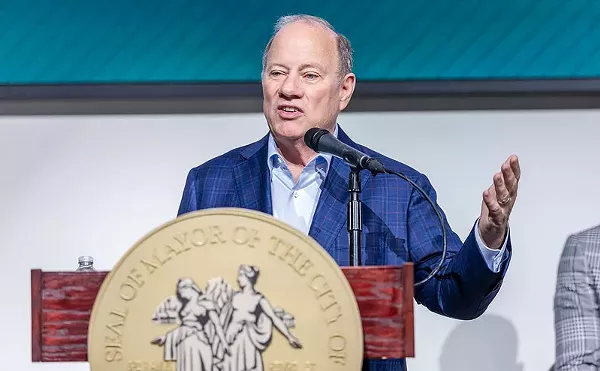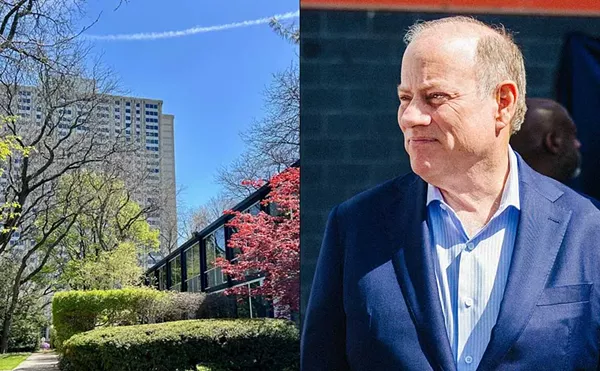
Audio By Carbonatix
[
{
"name": "GPT - Leaderboard - Inline - Content",
"component": "35519556",
"insertPoint": "5th",
"startingPoint": "3",
"requiredCountToDisplay": "3",
"maxInsertions": 100,
"adList": [
{
"adPreset": "LeaderboardInline"
}
]
}
]
Once again Michael Moore is on the outside looking in. Flint's prodigal son, and the world's most famous and controversial documentarian, is preparing to host an afternoon of private screenings and Q&A sessions for his latest film Capitalism: A Love Story, at the Riverfront 4 Theaters in the Renaisssance Center, owned by General Motors, the very company that he made his career criticizing.
Predictably, the suits are not eager to give one of their fiercest critics a golden photo op, and while the screenings continue, they refuse to allow interviews inside the building. So Moore and the press are unceremoniously hustled across the street to another hotel, tucked away in a nondescript ballroom complete with tepid, piped-in dance muzak.
Of course these corporate shenanigans only partially explain why the filmmaker is running more than an hour late, since the iconoclastic Moore runs on his own schedule and sets his own agenda. Yet General Motors isn't the only target this time, and Moore argues that America's economic gap is a chasm, and that the foundations of a corrupt political and corporate system are about to crumble. With a wink and nudge, Michael Moore wants you to help him push it over the edge, and then pick up the pieces.
Corey Hall: With health care in shambles and the auto industry in ruins do you ever feel like Chicken Little? That no one listens to you?
Michael Moore: Well the difference between me and Chicken Little is that he said the sky was falling, but for us the sky really has fallen. The economy collapsed right on our heads. For 20 years, I've been saying that GM was going to fall, that this wasn't going to work. I don't know, what's that ... what is that called? When you are actually right?
MT: So you're a prophet?
Moore: [laughs] Oh, no, that's a little scary.
MT: Do you feel like you're yelling into a tornado?
Moore: Basically, right. Which is frustrating, and after a while you wonder, "Well, why am I doing this?"
MT: At the end on the film you actually call for backup.
Moore: Yeah. I'm not going to do this alone anymore. The next time you Google George W. Bush or John McCain or whatever, and the word "nemesis," I don't want my picture coming up, I want your picture coming up, I want 5,000 pictures coming up.
MT: Times have changed a bit from when you first started. Years ago you told me that you felt The Daily Show was ripping you off.
Moore: I said that?
MT: This was early on, when TV Nation was still fresh.
Moore: Oh, I remember now, back in the Craig Kilborn days, somebody slipped me their proposal and the first line said: "This show will be like TV Nation but without the politics." They copied the style but it didn't have any real substance, it didn't have any punch.
MT: Now it certainly does have punch. Do you feel that being ripped off was maybe a good thing?
Moore: Yes, yes. Whenever this happens to me now ... I take imitation, as they say, as a form of flattery. Plus I'm all for people taking any ideas or anything, such as the film itself, and getting it out to as many people as possible.
MT: You're planting seeds.
Moore: I hope so. I think the people I've worked with have gone on to work on various shows. They've gone on to do things that I'm very proud of. Two of my longtime producers — who I gave their first network TV jobs to back in 1994 — made a documentary of their own [Trouble the Water] that was nominated for an Oscar this year.
MT: You were pretty much alone in 1988, documentaries were still very dry, PBS-y sort of affairs.
Moore: Being 20 years ahead of the curve or two years ahead of the curve doesn't really do any good. I think this film is hitting right on time.
MT: The curve is catching up?
Moore: I'm feeling the curve. We are there just a couple of feet ahead, and that's good. We feel the wind at our back.
MT: You heavily attack Ronald Reagan in Capitalism: A Love Story. Aren't you just going to enrage the right-wing media, going after their golden calf?
Moore: I think it will be surprising to a lot of people. History has been revised. They want to put him on Mount Rushmore, they want to take Franklin Roosevelt off the dime and put him on it. Before we get too far down the road, I want the truth told about what Reagan did to destroy this country.
MT: Conversely, you defend Jimmy Carter as a sort of visionary, though conservatives have really dragged his name through the mud.
Moore: I love that Jimmy Carter is so honest. He is a national treasure. The true boiling point for the right wing was at the 2004 Democratic Convention when Carter asked me to sit with him in his presidential box. I sat there with him and the image of that to Republicans was just too much, you know, the frothing at the mouth there was incredible.
MT: When you literally put yourself in a box with Jimmy Carter, it only made the right-left divide larger because it's so polarized now. What leverage are you trying to gain? Who is the audience that you are still trying to reach?
Moore: I'm trying to reach the 56 percent who were in favor of Barack Obama and the 60 percent who wanted more Democrats in the Senate.
MT: So this is a movie to rally the base?
Moore: No. I thought you were asking about Carter. Actually, I think that when you've got 1 in 8 mortgages in delinquency or foreclosure, or one foreclosure filing every 7-1/2 seconds, that's cutting across all kinds of party lines, class lines, race lines — and I'm hoping, with this film, that people will see that. I'm reaching my hand out to anyone, regardless of what their politics are, to say, "Hey, we're all in the same boat here; we're going to sink or swim together."
MT: Do you find it increasingly difficult with a media that loves to pick fights and then calls everyone negative? How do you cut through the noise?
Moore: I don't find it that difficult. First of all, I don't participate in the noise. I don't know if you've noticed, but I'm rarely on any of those shouting-head shows. I'm not a regular guest.
MT: You were on Jay Leno; that was kind of a shock.
Moore: Well, yeah, I was asked to be the guest on the second night of his new show.
MT: Does he want to go in a more political direction?
Moore: No. I think that Jay Leno was really moved when he watched this movie. He came here to Detroit; he has a real affinity for what people are going through in this recession. And to him it's not a Democrat or Republican issue — it's a human issue.
MT: Jay keeps his politics close to the vest.
Moore: That's not where he's coming from having me on. He called me up, it was Jay on the phone, and he said, "This is your best movie," and he wanted me to come on for his second night. I said, "I don't know if that's a good idea, is it? I mean first night Seinfeld, second night Tom Hanks, third night Robin Williams, isn't that the order here? You can have me on in 14 or 15 weeks, maybe."
MT: Is that American middle ground the audience you're after?
Moore: That's why I'm on that show, that's why I'm on The View next week, that's why I'm going to be on Oprah. I'm speaking to Middle America as I always have, as my films always have. I'm one of the few people on the left who has been able to have a wide, mass mainstream audience. Very few on the left get to enjoy that. I've been very privileged to have that mass audience, so I'm trying to speak to them.
MT: So, ultimately, do you feel government is more accountable than corporations? You can't walk across the street and talk to Fritz Henderson, but you can talk to your congressman. ...
Moore: First of all, I think it's pretty crazy on GM's part to move us over here. I should be over there [at the RenCen] talking to people going in and out of my movie, but here we are, shuffled into some mini-ballroom across the street because I'm not allowed on the premises for my own premiere to talk to press. I can go over there and watch the film if I want, but I can't talk to you. What country are we living in here? Don't you and I own General Motors?
MT: You were very vocal about [former GM chairman] Rick Wagoner getting fired.
Moore: Oh yeah! One of the happiest days of my life was seeing Obama fire the chairman of General Motors.
MT: The first complaint of one of my conservative colleagues at the screening was, "He has money. He has a huge house. He's a hypocrite!"
Moore: This from people who like money.
MT: It's like Traverse City [where Moore now lives] is the south of France.
Moore: [laughs] I could see, too, around 1776: "Thomas Jefferson, George Washington, John Adams are wealthy landowners, they've done well under the king! They went to the king's college! The king has done well. What do they have to complain about?"
MT: Your entire career should have been nonprofit.
Moore: Actually, I have a whole nonprofit model created at the State Theatre up in Traverse City, for small towns in Michigan. But that's another story. ...
MT: But that's a fairly consistent attack on you; that you can't condemn the rich and be rich yourself.
Moore: It's because it really drives them crazy. They know somebody like me who gets some money, that's dangerous. Because I don't want to buy a big boat, what am I going to do with that money? I'm going to cause a ruckus with it. I'm going to be able to make my next film and the film after that and the film after that and no one can buy me. So you know what you're getting from my film. Nothing has been taken out to please a corporate boss at the studio, because if I don't do that [mock terror], "They won't let me make my next film. Oh, you won't let me make my next film? Oh, well, fine, I'll do it myself."
They understand that and that's why conservatives don't like it, because they know that it's fuck-you money, they know that it gives me the freedom to do and say what I want.
Corey Hall writes about film for Metro Times. Send comments to letters@metrotimes.com




